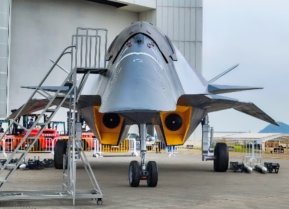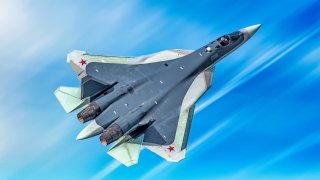Russia's Su-57 Felon Could Be Flying for a New Country
There is considerable speculation that Algeria may be the initial export customer for the Su-57E, which doesn't come as a tremendous surprise as Algiers has been eyeing the fighter for several years.
The Russian-made Su-57 Could Soon be Operating From Africa: The Lockheed Martin F-35 Lightning II has found customers around the world, making it the premier fifth-generation in service today. Russia's United Aircraft Corporation (UAC) has struggled to find the same level of foreign buyers for its Sukhoi Su-57 (NATO reporting name Felon) – yet, coming out of the 15th China International Aviation and Aerospace Exhibition earlier this month, the Kremlin announced that it had lined up a customer.
There is considerable speculation that Algeria may be the initial export customer for the Su-57E, which doesn't come as a tremendous surprise as Algiers has been eyeing the fighter for several years.
"Algeria makes history again! First customer of the MiG-25, now the first export customer of the Su-57," Algerian aerospace blogger/military analyst KAD-GHANI wrote on X, the social media platform formerly known as Twitter.
Algeria and Its Air Power
The Algerian Air Force currently operates a variety of Soviet-designed aircraft, including the Mikoyan MiG-29 and Sukhoi Su-24 dating from the late Cold War, while it has ordered around a dozen Sukhoi Su-30sMKA in 2022.
Moscow has maintained close ties with Algiers since the Cold War when the Soviet Union provided military, technical, and material support to Algeria during its war for independence from France.
According to the Washington Institute, in recent years, more than three-quarters (76%) of "Algeria's arms imports have come from Russia," while "Algiers is consistently a top-five destination worldwide for Russian arms." Between 2016 and 2020, Algeria purchased $4.2 billion in arms from Russia, accounting for 14.9% of Moscow's arms sales.
What Does Algeria's Adoption of the Su-57 Mean for NATO?
Algeria has expressed interest in the Su-57 since 2019, in part to counter Morocco's military buildup – with Rabat adopting the F-16C/D Fighting Falcon Block 72 from the United States. The two nations have been involved in a regional arms race, and Algiers' adoption of the Su-57 could allow it to maintain air superiority, even though it could be years before the first fighters actually arrive in North Africa.
The bigger consideration is what it could mean for NATO, especially Spain, France, and Portugal. None of those nations currently operates the F-35. While France and Spain are partners in the Future Combat Air System (FCAS) program with Germany to develop a sixth-generation fighter, it won't enter service until at least the mid to late 2030s.
The French Dassault Rafale and Spain's Eurofighter Typhoon are both highly capable multirole/ominrole fighters, but NATO could see a future where a Russian ally has a more capable stealth fighter in service. As Bulgarian Military reported, officials in Madrid have valid concerns given the complex relationship that exists between Spain and Algeria.
Perhaps Algiers' adoption of the Su-57 could spur Madrid to purchase the F-35 to maintain a balance in the region.
Author Experience and Expertise: Peter Suciu
Peter Suciu is a Michigan-based writer. He has contributed to more than four dozen magazines, newspapers, and websites with over 3,200 published pieces over a twenty-year career in journalism. He regularly writes about military hardware, firearms history, cybersecurity, politics, and international affairs. Peter is also a Contributing Writer for Forbes and Clearance Jobs. You can follow him on Twitter: @PeterSuciu. You can email the author: [email protected].
Image Credit: Creative Commons and/or Shutterstock
From the Vault


